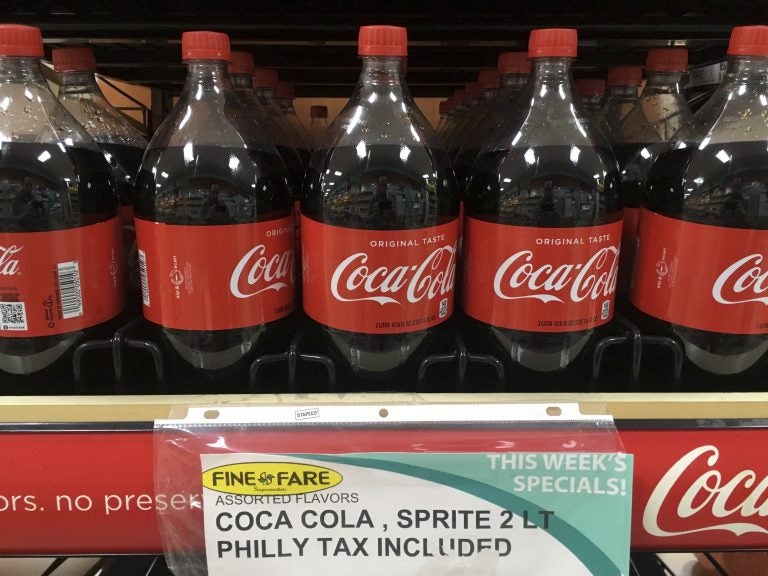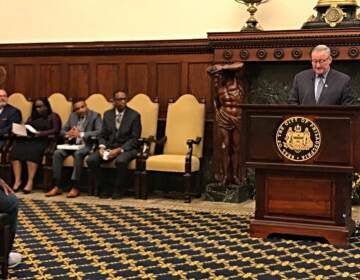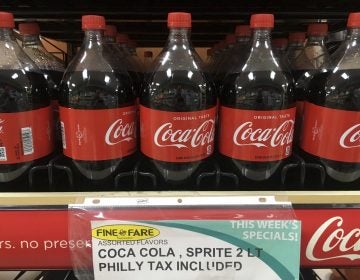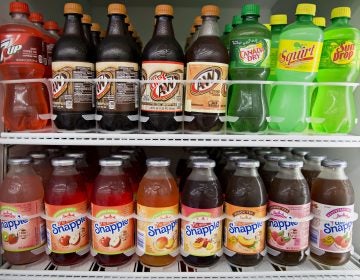Philly’s soda tax had little impact on sweetened beverage consumption, a Drexel study finds
A new Drexel study suggests the tax’s impact on city residents’ habits may be more modest than first expected. Earlier research had suggested otherwise.

A sweetened beverage tax sign is posted by sweetened beverages at a supermarket in the Port Richmond neighborhood of Philadelphia, Wednesday, July 18, 2018. (AP Photo/Matt Slocum)
One year into Philadelphia’s soda tax, a Drexel University study found the tax had minimal influence on people’s consumption of sugary beverages.
Philadelphia, the first major city to impose this type of levy, first implemented the tax in January 2017. Researchers from Drexel’s Dornsife School of Public Health found that after 12 months, 39% of Philadelphians and 34% of residents in nearby cities said they drank fewer sweetened beverages, which results in only three fewer soft drinks per month. The team of researchers did not consider this statistically significant.
The results of the study, published this month in the International Journal of Environmental Research and Public Health, suggest that the tax’s impact on city residents’ habits may be more modest than first expected.
In a randomized phone survey of 515 adults living in Philadelphia and, for comparison, in nearby cities including Camden, Trenton and Wilmington, respondents answered questions about how often they drank soda, fruit drinks, energy drinks, and bottled water over a one-month period in early 2017, when the 1.5 cents-per-ounce tax was first levied.
The same group reported their consumption over a 30-day period one year later, between December 2017 and February 2018.
Drexel researchers published a different study in 2018 that suggested the opposite — that Philadelphians would drink less soda as the result of the increased price.
That study, published in the American Journal of Preventive Medicine, surveyed city residents both before and after the sweetened drink tax went into effect. Also surveyed were people living in three other cities without the tax. The team found that people in Philadelphia were 40% less likely to drink sweetened beverages daily after the tax went into effect, compared with residents of cities without the tax.
Another study last year from the University of Pennsylvania’s Perelman School of Medicine found sweetened drink sales in the region dropped 38% in the year after the tax went into effect.
In the latest Drexel study, the research team suggests that most of the early surveys and studies did not account for “negative pressures on health decision making, such as persistent consumer preferences, intensification of marketing by [sweetened beverage] manufacturers or retailers, or availability of cross-border shopping.”
In addition, the Drexel researchers wrote that recent studies on significant reduction of sales do not show individuals’ consumption of soda outside of the home, in restaurants, through vending machines, and at friends’ or family’s houses. The report also says that sales data studies have had trouble detailing purchases made outside of Philadelphia.
Philadelphia’s soda tax was controversial from its inception — facing opposition from within City Council all the way to the Pennsylvania Supreme Court. The tax has been used to increase the city’s general fund as well as support local education programs, including expanded pre-K. It has also been a major funder for Rebuild, the city’s initiative to pay for improvements to local parks.
Cities around the country that have imposed soda taxes have used them as a public health tool to curb increasing rates of obesity. Berkeley, California; Boulder, Colorado; Oakland, California; Albany, New York; San Francisco and Seattle are among cities with the tax.
In Philadelphia, more than 68% of adults and 41% of children are overweight or obese. According to the city’s Community Health Assessment, 32% of adults and 18% of teens citywide drink one or more sugary beverages per day.
“We have ample evidence that sugary beverages are connected to type 2 diabetes, obesity, cardiovascular disease, and other health issues, but we’re seeing that raising the price of sugary beverages may not impact consumers who don’t drink a lot of soda,” said study co-author Amy Auchincloss, a professor in the Dornsife School of Public Health.
When asked why the results of the various studies differ so, Auchincloss said, ”As public health researchers, the advantage with looking at consumption is that consumption is a more public health-relevant outcome and is agnostic to how/where the beverages were obtained.”
The new study’s lead author, Yichen Zhong, a doctoral student in public health at Drexel, said other socioeconomic factors may also explain a Philadelphian’s consumption patterns. In their report, researchers mention that future studies should test “whether the tax’s effect differs in vulnerable sub-populations.”
“The availability of untaxed sugary beverages outside of Philadelphia, the still relatively lower price of these drinks compared to healthier ones, and marketing and advertising may explain the low effect of the tax,” Zhong said.
The tax raised $191.7 million in its first 2½ years, between January 2017 and June 2019, according to city revenue data.
WHYY is your source for fact-based, in-depth journalism and information. As a nonprofit organization, we rely on financial support from readers like you. Please give today.





